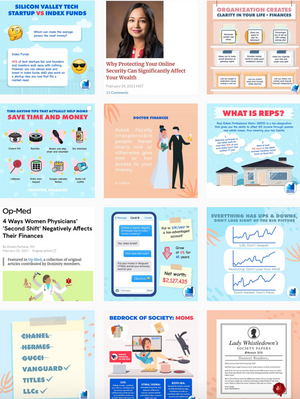I have read a few books on how to teach children about finances, and I haven’t found something that I loved. So here is my attempt on making a well-informed post; let me know what you think because it’s a little different from all of the other posts I have read.

Growing up
Growing up, the one thing my mom taught my four siblings and I about finances, is the art of SAVING. Although we were low-income, this concept took us far, and none of my siblings are in debt, with the exception of graduate student loans, and perhaps home mortgage loans in the future (we are all in our 20s-30s). Yes, my mom didn’t know or trust investing (which now I try to explain to her), or how in some cases it can be wise to keep a low interest loan (eg. rate 2%) to invest rather than pay off. But she taught us the most important basic and foundation of finances which is saving, and because of it we never felt the fear of running out of money.
Mindset
From a young age, we were taught and encouraged to save. Every penny ever earned by us through community programs, internships, summer programs etc. needed to be saved and not used to buy anything or splurge on anything. My parents would provide us with what we needed and they would lead by example by saving, spending on necessary items, and donating. We were encouraged to just save and not donate yet, this would come later. And this mindset developed from a young age helped all of us siblings have a small amount of savings even while in high school. And keep in mind, we were low-income, so we never received allowances or large cash gifts from family. So while all of our friends were buying the newest Jordans or Timberland boots, wearing Abercrombie and Fitch and showing off the prettiest purses, we just kept saving because that’s what we were taught. During senior year of high school, we all applied for every scholarship and grant available (for both merit and financial need). In HS and college, we worked at every reasonable (within class schedule) side-job we could find and we visited the financial aid office often. This mindset really helped us get the proper footing with our finances when we were older.
5 Things To Teach Children
With this background experience, this is what I recommend and hope to teach my children as well:

- The number one thing to teach children is that debt is not good. This includes borrowing from others or spending money that you don’t have yet, like through a credit card.
- Next, the most valuable thing for them to understand is that saving is the most important concept, this is the GOLD STANDARD. Even before donating, giving, helping others etc., savings is the foundation of building wealth. It’s important for them to understand this concept and apply it themselves, so that they feel proud, empowered and happy to save. Saving is hard as a child especially if they earned the money, and everyone else around them is spending it. But if they are shown how to save, and why to save such as for their future, college expenses, help those in need, and gain financial security, they will be happy to work towards this goal. I remember the first time I earned money in 5th grade for a program called CityServe, and I was given $100. I was encouraged to save that amount and since then my personal savings grew. Subsequently, I earned money through poetry contests (savings bond), summer stipends, tutoring, teaching, as a lab assistant, and as a scarlet ambassador tour guide in college, and each time all of that money was saved. By saving everything, I developed a security blanket with money and just loved the challenge of saving.
- Kids don’t need to donate to charity right away. It’s important to first develop the skills of savings, and parents at the same time should always talk about how they are giving to charity, why and how much. Our parents always gave money to charity and let us know how and why, and this concept of giving was ingrained in us at a young age. Once we were older and had enough savings, we started with making small donations, and now that we are in our 30s, we easily and happily donate after doing proper research and making informed decisions on who should receive the donations. (One of us has even established a non-profit to help those in need in developing countries).
- The only thing I would add to my mom's savings concept, is that earned money from a young age can be saved in a RothIRA which will generate tax-free returns, which is better than just saving in the bank (like we did).
- So when can you spend? Basically once you are older and you can make informed decisions about your purchases without being too influenced by peers or marketing, so perhaps after graduate school or a few years into a new job and you have enough savings.
Spending
Boy, is spending easyyy, it’s not a concept that needs to be learned -- companies and marketing teams are very good at teaching this to everyone.

I remember the first time I realized I can actually spend money on something just because I liked it, not because I needed it (at all!). It was around 2nd year of graduate school and my spouse and I had enough savings, and I had discovered Gilt and RueLala (these companies sell designer stuff that are marked-down) and it was soo cool and fun. But after a few purchases, I quickly realized stuff doesn’t make you happy and noone in the medical field cared about what I wore, so it was not a hobby that continued. But I was able to and I still am, able to make purchases that are nice and not only because it is necessary. [I should note, one of these days I will post about my dumbest financial purchase - hint: red sports car, haha]. Though since then, I focus more on experiences, helping my extended family and giving to charity. These three things make me most fulfilled which are empowered by having financial security and being able to help others in a meaningful way.
What do you think ? I’m always welcome to your feedback and thoughts!





